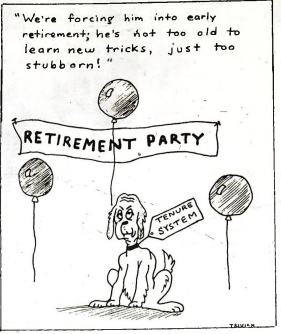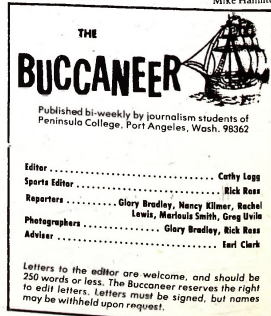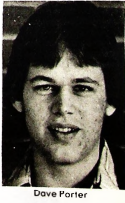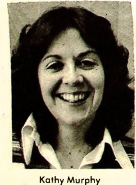
Few understand tenure system
By NANCY KILMER
The tenure system affects
students as well as faculty—
but how many students know
what it is or how it operates?
A Buccaneer survey
reveals that few students
have enough information
about the tenure system to
give an opinion.
“The ten-year system? Is
hat as opposed to an eightyear system?” asked one
unidentified student.
Other responses to the
question: Do you approve or
disapprove of the tenure
system?
Gary Oberg: “I approve of
the tenure system because it
protects teachers from
personal biases of upper
echelon bureaucrats. It
allows each instructor to
implement his own methodology of instruction.
Although it does protect a
few wags, the overall effect
has a positive outcome on the
school.”
Maria Sclafani says, ‘‘I
think the tenure system gives
the instructors a certain
amount of freedom to be
controversial without fear of
losing their jobs. I do think
there should be some kind of
evaluation of teachers, and if
there arc enough valid complaints, there should be some
effective measure of correction. The most delicate part
of the system is who does the
evaluating.”
Students also were asked:
How do you feel about the
recent changes in the tenure
system?
‘‘I understand that the
changes are for the better,”
says Dan Long. “The tenure
committee should represent a
broader cross section of the
faculty and student body.
The concern should be with
quality, in instruction rather
than quota in the classroom.”
What would you replace
the present tenure system
with?
A limited tenure system,
suggests Rachel Lewis. She
says, “Granting an instructor tenure for, say, five years
at a time would give them the
job security they need, but it
would keep them on their
toes. They’d have to keep up
with modern teaching
methods and they couldn’t
slack off on the quality of
their classes.”
Blood drive announced
The Puget Sound Blood
Program will sponsor a
blood drive at Peninsula
College Feb. 26 in the college
gym.
Donations will be taken
from 9:30 a.m.-12:30 p.m.
and from 1:15 p.m.-3:30
p.m., by appointment. Jim
Cameron, PC coordinator
for the blood drive, says
donors may schedule their
appointments through him,
and should allow an hour for
blood collection.
Juice and cookies will be
provided for donors.
Cornaby teaches, ‘presidents’

By NANCY KILMER
What does Dr. Paul Cornaby, the president of Peninsula College, do?
“He presidents,” says his
secretary, Lucile Mealey.
Dr. Cornaby is more elaborate in his description of his
job: “The president, by law
and by contract, is responsible to the Board of Trustees
for the efficient and effective
functioning of the college in
meeting its statutory objectives,” he says.
As president, he has a
leadership function from the
standpoint of coordinating
and decision making. Dr.
Cornaby is a planner, both
short and long range, for
determining the future of the
college. He also is a reporter,
keeping the Board of
Trustees informed as to the
effectiveness and efficiency
of the college and its programs. In general, he insures
that the primary function of
the college—education—is
operating smoothly.
Besides “presidenting,”
Dr. Cornaby teaches a class
in English literature. Teaching isn’t something new to
Dr. Cornaby. He’s taught
English at many schools,
among them Westminster
College in Utah, Idaho Falls
High School, Brigham
Young University, Highline
Community College, and
Seattle Community College.
Dr. Cornaby received his
B.A. in English from Westminster College and his M.A.
in English from Brigham
Young University, both in
Utah. He has done graduate
work at Idaho State University, and the University of
Washington, where he
received his Ph.D. in the
higher education academic
area of English.
Dr. Cornaby became president of Peninsula College
in July 1975. He previously
worked in administration as
associate dean of liberal
studies at Seattle Community
College; associate dean of
instruction, feting dean of
instruction, and dean of
instruction at Seattle Central
Community College.
Dr. Cornaby says he likes
the student contact afforded
him in the administration of
community colleges. “In the
larger schools, you don’t get
to meet the students,” he
says.
Dr. Cornaby’s outside
interests include playing the
violin with the Port Angeles
Symphony Orchestra and a
local chamber music group.
He also likes tinkering with
machinery, cabinet making
and working with wood. He
has done a great deal of work
on his own home.
Wilcox rehired;suspended
Alberta Wilcox, former
PC bookstore clerk who was
fired from her job Oct. 23,
was reinstated this week by
order of a Higher Education
Personnel Board hearing
examiner.
Ms. Wilcox was ordered
reinstated with full back pay
based on a technical error in
the procedure after she was
fired by PC Business Manager Frank Thayer.
Following the reinstatement, PC President Paul
Cornaby suspended Ms.
Wilcox without pay for two
weeks.
Neither Dr. Cornaby nor
Ms. Wilcox were available
for comment.

Film called ‘distasteful’
The Rocky Horror Picture
show will be shown at Peninsula College as part of the
Pete’s week activities.
The movie will be presented at 10 p.m. and 12 a.m. on
Feb. 16. Admission is $1.50
for students with an ASC
card and $2 without the card.
The movie is a transvestite musical comedy and is rated
R. It could be termed rude,
crude and socially unacceptable, says Jim Cameroh;
ASC president.
William Lucas, English
instructor at Peninsula College, says the show is the most
distasteful movie he has ever
watched.
Club finds problems
Christians on Campus has
been trying recently to reestablish a . club which
proposes to provide a time
and place for Christians and
others who are interested to
meet, supply an invitation to
interested people, to provide
Christian activities for the
college age group, and
provide discussion, Bible
study and prayer on topics of
interest to the club members.
However, Christians on
Campus is in conflict with
state-mandated guidelines,
which require that if such a
group is officially recognized
it can only use the college
facilities and student body
funding if the proposed
activities do not amount to
religious worship, exercise or
instruction.
‘‘As a college club we
should be submissive to our
authorities over us; thus we
are re-organizing our constitution to meet the requirements of the attorney general
of Washington state,” Greg
Uvila, president of the
Christian organization, said.
‘Dr.Glas’ to show
“Dr. Gias” the sixth film
in the modern foreign film
series, will show Monday at 7
p.m. in the Little Theater.
‘‘Dr. Gias” is done in
Danish but has English subtitles. Filmed in 1969, it is
about an alienated old man
who wanders Stockholm and
reluctantly remembers his
youth and crucial moments
in his life. It stars Per Oscarsson as Gias, who has been
called ‘‘a wonderful actor
who seems to have born an
agonist of spiritual
torment,” by New Republic.
Mae Zellerting, successful
woman director, powerfully .
dramatizes “Glas’s” many
fold consciousness with
memory flashbacks and daydreams, according to
advance notices on the film.

Editorial
Tenure doesnt protect students
The tenure system, that scratchy old dog that lies around
the educational system being unduly spoiled and pampered,
should be gracefully retired. But what should take its place?
Too often, criticism of an accepted policy or procedure
makes people think one seeks only its abolition and not a
viable alternative. Such is not the case here.
The tenure system was designed as a protection for teachers, and we acknowledge that teachers do need certain
protections. The problem with the tenure system, however,
is that in structuring the protection that was needed, the
powers that be overcompensated and locked in iron-clad
rules which made effective evaluations impotent.
Teachers are instruments of learning. They help us to learn
and interpret ideas and information, as well as to think and
apply these ideas to our lives. Creative teachers who put
themselves wholly into their profession are the catalysts for
eager minds. On the other hand, teachers who don’t try or
don’t care not only prevent students from accumulating
knowledge and ideas, but they also ruin their attitudes
toward learning itself. Students pay for their education and
they are grossly shortchanged when they get less than the
best the school system has to offer.
Teachers have a right and an obligation to speak out.
Freedom of speech, aside from being a constitutional right,
is a learning method. In classrooms everywhere, teachers
instigate comment, discussion and agrumentation which is a
healthy, productive means of education. Certainly, one of
the intentions of the tenure system was to further protect
this right so that teachers whose opinions were not popular,
or did not follow the accepted and traditional standards,
could not be fired simply because someone didn’t like what
they said.
The system which should replace the current tenure
system should protect both teachers and students, which it
does not.
Standards must be set which control evaluation reasonably
to insure that teachers are evaluated on their effectiveness
and their capabilities. Their politics, religion, lifestyle,
attitudes and opinions are not the criteria for good teaching,
and teachers should not fear loss of their jobs on those
grounds.
They should, however, fear loss of their jobs when they
fail to achieve what they get paid for—teaching. Many
teachers in the educational system are either too old, too
stubborn or too uncaring to teach. Age itself is not a guideline. One teacher may be old at 40 while another may be
quite young at 70. The key is the personality and caring of
the individual. Teachers have the right to teach as long as
they want, as long as they maintain their effectiveness.
Students have the right to not be subjected to someone
who has nothing to offer in the way of teaching. The tenure
system could be revised so that tenure is not a permanent
employment. If teachers had to maintain their standards and
quality in order to preserve their tenure, we would find a
much higher quality of teaching in our schools than we have
now because those who couldn’t produce would be weeded
out.
Part of the failure of the present policy is that teachers
who evaluate other teachers are too often reluctant to
criticize them. When criticisms are made, there is little the
administration can actually do to force a tenured teacher to
improve his methods as long as he is violating no laws and is
broadly within the interpretation of “competent.”
The solution, then, is a modification of the whole system.
Teachers and administrators must be more demanding and
more explicit in evaluations. The criteria for evaluation must
be only the quality of teaching; evaluations must be
competent and fair, and tenure must not be a working
retirement. It must be both limited and renewable. The
educational system’s self-castration must stop; it is time for
potency and change to be injected into the schools for a
return to high quality instruction.
—By Cathy Logg
Auto student wins award
Dave Miller, PC automotive mechanics student,
was awarded third place in a
Vocational-Industrial Clubs
of America competition in
Ellensburg Jan. 19 and 20.
Miller is president of the
local chapter of VICA, a
club designed to further
vocationally-oriented people
in their fields. Along with
two other automotive
students and two diesel
mechanics students, he will
compete in VICA’s state
competition Apr.l9-May 1
in Yakima.
PC’s VICA Club will be
host to the secondary (high
school) regional run-off
competition at the automotive shop Feb. 21 beginning
at 8:30 a.m. Other VICA
activities include entering
several cars in the Sequim
Irrigation Festival Demolition Derby.
Letters
Studium Generale returns
Editor, The Buccaneer:
Your editorial of Jan. 19
was most persuasive in its
plea for the early resurrection of the 1974-75 Studium
Generale, now a mighty
academic legend. Actually, I
have not been able to account either for the persistence of the legend or for the
annual demand since few
students remain who remember that famous year. Even
Ron Allen has vanished,
which tells us something
about “permanent” human
institutions.
Your editorial also
challenged me to overturn
the “shuffling bureaucracy”
which has been unable to
produce the corpus. The
truth is that Studium
Generale is not really dead; it
has not even gone away. The
Public Service Committee,
composed of both faculty
and students, has planned
and presented “Studium
Generale” regularly for the
past two years, including
programs literally identical
to those presented in 1974-
75.
The committee has had an
annual budget of $4,000,
which has made it
unnecessary to rely upon
charity and persuasion, as in
former times; nonetheless,
many of the programs have
been marked by lack of
student attendance. Perhaps
it was the required attendance which made the original
Studium Generale so attractive. Perhaps it was the one
elective and painless credit.
Perhaps it was something
else.
Whatever the case, the
shuffling bureaucracy
apparently has not been fulfilling an important student
need; therefore, in observation of the principle vox
studiosi, vox dei, and with
academic concurrence,
Studium Generale will return
to campus formally for one
credit beginning spring
quarter. We hope fervently
that we will be able to
accommodate all who will
wish to register.
Paul G. Cornaby
President, Peninsula College
Teachers forget boss
Editor, the Buccaneer:
In response to Ms. Logg’s
editorial in the last edition of
The Buccaneer, I’d like to
suggest that high levels of
state funding of college education have certain disadvantages. The following
excerpt from Kenneth M.
Setton, “Questing the Life of
a Scholar”, describes medieval college education:
“The students also
brought professors to heel by
threatening to boycott their
classes. The students paid the
professors, hence had them
at their mercy. A professor
had to swear obedience to the
students’ rector; he could not
vote in the university congregation, yet was bound by
its decisions. Thus, while a
student had to attend only
three lectures a week, a professor could not absent him
self a single day without the
students’ permission. If he
wanted to leave town, he had
to deposit money to ensure
his prompt return.
“Moreover, each day that
he failed to draw at least five
students for a lecture, he was
fired as though absent. If he
fell behind in the texts, a fine
was deducted from money he
had placed in escrow at the
start of the year. Certain
students reported infractions. The most dreaded penalty, the “privatio’, banned
the professor (and sometimes
his descendants!) from lecturing, thereby depriving him
of his livelihood.”
Today, the state pays
much of the cost of college
education. Perhaps this is
why instructors occasionally
forget who they really work for.
Mike Hamilton
Class prepares boats
Peninsula College’s Tuesday night fiberglass class is
preparing four sailboats for
future use for PC students.
Irvin Myers, instructor of
the four-hour class, said the
class is just finishing its first
sailboat and he expects to
have two boats ready by the
end ofthe quarter.
The damaged sailboats
earlier acquired by PC for
student use were turned over
to the class for repair.
“There is a lot more
internal damage to the boats
than we thought,’’ Myers
said.
“Students are really interested in working with fiberglass and we’re spending
most of our time on the boats
so we can gain experience,”
he added.


Penguins Saints visit for Pete’s Week
The Peninsula Pirates are
looking for another league
win this weekend as they play
host to Mt. Hood tonight
and Clark tomorrow night,
accenting activities of the
1979 Pete’s Week.
The Pirates’ two games
this weekend and another
home contest against
Highline Wednesday will
mark the end of the season,
as Peninsula presently sits in
the league’s cellar with a one
win, 11 loss record.
Peninsula could potentially knock off any of these
teams with the help of the
home crowd after returning
from two consecutive away
games. The Pirates fell to
Mt. Hood 102-68 in their
earlier meeting this season in
Gresham, Ore. Jan. 19.
Peninsula also lost to the
Clark Penguins 61-59 in a thriller on their court Jan 20.
Peninsula has had a taste of winning since those outings, as the Pirates evened the score with both the Western Washington University jayvees and the
Olympic Rangers, the Pirates
beat the WWU jayvee squad
72-63 there Feb. 2 at Bellingham and kept it going the
following evening at Bremerton, winning easily 89-72
over the Rangers.
After these two wins Peninsula traveled to Lower
Columbia and was run over
in the second half by the
taller Red Devils who came
away with an 81-73 win.
Peninsula was on the road
again last Saturday where
they gave the Centralia
Blazers a run for the money
but again came up empty,
losing 72-63.
“It’s not what we did, it’s what we didnt do,” said coach Mike Clayton. “We just didnt play with intensity and aggressiveness in the second half.”
Dave Porter led the Pirates
with 16 points and 11 rebounds in the contest. Scott
Gray and Mike Madison
added 10 and nine respectively.
Basketball important to EX- Chimacum standout

By MARLOUIS SMITH
The tallest member of the
Peninsula College basketball
team this year is Dave
Porter, reaching the height
of 6’7”.
Dave plays center for the
Peninsula Pirates, and it’s
his first year of playing
college basketball due to a
knee injury he received last
year. Dave presently leads
the squad in rebounds.
Dave is no novice when it
comes to basketball. While in
high school in Chimacum he
also played center and made
second team all-state, class B
division. And basketball isn’t
Dave’s only sport, as he also
played tennis and football in
high school.
Last year Dave came in
second place in 2 on 2 basketball, and while it’s an important part of college life for
Dave, basketball isn’t the
only thing that interests him.
Dave’s music ability led him
to play the sousaphone in his
high* school band. Then last
year Dave was in the college
play production of “Guys
and Dolls.” When it comes
to relaxing, Dave goes in for
a friendly game of backgammon, a new intramural
sport which he is a part of.
When the basketball
season ends Dave will go into
weight training. He is also
majoring in general studies
and hasn’t decided if he will
return to Peninsula next year
or go to another college such
as Whitman, where his
brother plays basketball. Or
he might go to Willamette
University in Salem, Ore.
So far Dave is in fifth
place in the basketball league
for rebounds, but basketball
is a fast changing sport and
you can never rely on the
odds.

Interest in PE gone? Livingston says no
By RICK ROSS
Jon Livingston’s physical education department is suffering
the enrollment blues. Because PE is no longer a requirement
at this institution, there is a need for student interest in these
one-credit courses. This interest is presently centered
around self-conditioning.
Seventy students are enrolled in Mr. Livingston’s body
conditioning, slimnastics and weight training classes this
quarter. These courses are designed for individuals who are
concerned with “getting in shape.”
But what happened to team sports and fun? A total of
seven people signed up in three badminton classes. Six
signed up for men’s basketball and five for volleyball.
These team sports require bodies. Where are the students
and why aren’t they interested?
Mr. Livingston claims this is a national trend, and that
interest is growing away from team sports. If this is true,
why are 60 students in the intramural basketball program
and 45 playing IM volleyball? And what about “open gym” on
Monday and Thursday nights, when the place is usually
packed with students playing basketball and volleyball?
The interest in team sports and fun is still here, and the
opportunity to get college credit, develop skills and have fun
in these activities is offered through the PE department. So
why aren’t people enrolling? There must be other reasons.
What does the administration have to say about it? Floyd
Young, PC dean of instruction, says he is not satisfied with
the PE department. Neither is Fran Prindle, college registrar.
Both are in disagreement with Mr. Livingston s philosophy as
to how physical education should be taught. They are also
concerned with the low enrollment and have received many
student complaints, both written and oral.
Mr. Young has gone over these points with Mr. Livingston,
offering suggestions toward improvement based on student
complaints. Mr. Livingston so far sees no reason to change.
What do the students think? Most or all agree that Mr.
Livingston is well rounded in the field. He teaches 15 to 20
different sports through a school year and is knowledgable
about all of them. He attended the University of Oregon,
which is ranked number one in the nation in PE.
The disagreement comes in discussing his methods of
teaching. One student said, “He’s a heck of a nice guy but a
lousy teacher.” ,
States another, “His tests are unfair. They re based on the
class as a whole and not individually.
“He expects you to know things and doesn’t like helping
you individually when you need it,” adds a female student.
Other complaints involve his means of testing based on
skill, his philosophy about not stretching out before rigorous
exercise and the way his classes are run at one level, not
accounting for varying abilities of the students as
individuals.
Many of the students disagreeing with Mr. Livingston’s
philosophy either don’t enroll in PE courses, or take classes
and complain. The administration received seven written
complaints from students in the PE program last quarter,
compared with none for any other department.
Other students simply drop out. Last year (1977-78) only 70
per cent of Mr. Livingston’s students completed his courses.
The year before he had a 68 per cent completion rate. This
•means that in each of his classes, three out of every 10 will
drop out.
Mr. Livingston contends this completion rate also holds
true in the academic departments. He is right. Academic
completion is at 70 per cent. But how can you compare PE
courses to Chemistry 140, physics or engineering?
According to Mr. Livingston, PE should be taken literally as
physical education. It should be taught like an academic
course, where effort, improvement and different skill levels
are not considered.
His grading theory is based on skill and attendance. “The
more skilled you become the more you enjoy the sport,” he
says. This also means that previous training or experience is
vital for a good grade. Students who begin with little or no
previous experience suffer under this philosophy.
He does have an answer for this, however, as students can
always take a pass-fail or audit any of his courses. If they
want fun and recreation they should sign up for intramurals
and not PE, he says.
Despite these arguments, the problem is still there. The PE
department is not satisfactory to the administration or the
students. There are several options available to solve the
problem. Mr. Livingston could listen to these complaints
objectively, discuss them with the administrators and reevaluate his philosophy to better suit student wants and
needs. He could leave things the way they are and hope to
boost enrollment by convincing students that he is right
about they way things are run. Or, the ultimate solution
could be for the administration to replace him with someone
better suited to their philosophies about teaching PE.
Dormies praise Saga’s new look
By GLORY BRADLEY
A Buccaneer survey of
how dorm residents feel
about Saga Food Service
shows general approval of
the improved service.
Some say the improvements which have been made
are “fantastic,” and others
that they are just “too good
to be true.”
“Overall, for the cost I
feel that Saga Food Service is
a pretty good deal. I don’t
think a person could get the
amount of food we do for
the cost anywhere else,” says
Lance Whidden.
And new resident Theresa
Ikeda says, “I expected rubbery eggs and stringy everything, but it’s not really that
bad.”
Another new student,
Anabell Casavant, says, “I
wish they would serve more
proteins and less starches,
because an hour after one
eats one is hungry again.”
And second year dormie
Gillian Abshire says, “I
don’t appreciate a cricket in
my broccoli, but on the
whole there has been an
improvement in the food.”
On the pther hand, Julia
Rowe says, “The food has
improved but I think it’s just
too good to be true; it could
slowly get bad again.”
Says Leroy Winans: “We
noticed how bad the food
was last time. If it gets bad
again we’ll notice it and let
them know about it.”
Other dorm students commented on the change in the
food with the beginning of
the new quarter. They report
more fresh fruits, more of a
variety of meats, and little
things like fresh cauliflower,
sunflower seeds, mushrooms, and onions at the
salad bar.
They also note ». uite a
choice of breads available,
such as English muffins,
sourdough, raisin bread, and
white as well as wheat. Even
honey and diet Pepsi is available.
SAGA Manager Chuck
Urbanowicz says the reason
for the change is because he
has been there to make sure
everything is right. He says
that at the end of last year
things were getting a little
monotonous. After three
years of working for Saga “It
gets to the point where I
couldn’t see the forest for the
trees. Everything was just
fine and I would just overlook all the little things.
Everyone was doing their
job, and they knew what they
were doing, so it was left at
that,” he said.
Now he is here every day
to make sure all are doing
their jobs and taking care of
the little things which make
the difference between good
and bad food.
If dormies have any suggestions, they can put them
in the Saga suggestion box or
tell the hall respresentatives
about them, and they will
bring it up to the food committee at their rep meetings.
Musical set for Mar.8

“Good mime” . . .
“Maybe a little more light”
. . . “Nag, nag, nag, nag,
nag,” . . . “You carried it
through well” . . . “That’s
funny,” . . . such are some of
the comments made as the
music theater class rehearsed
for its upcoming performance March 8.
“Without the scripts the
cast showed a lot of energy.
Characters are really starting
to emerge and the cast is
working together well,”
Director Bonnie Graves said
after the rehearsal.
“Stop the World” is a
colorful, fast moving, fun
musical that should bring joy
to the audience on opening
night, and with the
combination of the mime
and music it makes it a
unique play. The
performance centers around
a clown who seeks for
happiness and finds out that
the little things in life make
him all the happier.
Student Standout
Veep keeps busy
By RACHEL LEWIS
“I’m really glad to be a
part of the student government. It keeps me very
busy,” says Galen Tornaby.
Galen is vice president of
the Associated Student
Council and a sophomore at
Peninsula College.
He says being vice president has given him an opportunity to see how the college
is run, and he likes being
involved in the student government administration.
One of his jobs is to book
activities for the college. “I
try to book activities that will
attract not only the youth of
the college but older people
and their families as well,”
he said.
Galen says the student
input is much better this year
but that there could be much
more.
“Student government has
a lot of influence, and with
increased student participation we could get more
accomplished,” he says. He
adds that people never seem
tp know what’s going on—
but it’s all on the signs on the
sandwich boards. Galen was born in Seattle
and lived there all his life
before he came to college.
There is always something to
do there and Seattle has a lot
of youthful type night life, he
says.
“You’re closer to better
skiing and are always
meeting new people,” he
added. “However, Seattle is
a hustle bustle fast type of
life and I like being away
from the traffic jams and the
constant crowds when shopping,” he said.
would say the air is
easier to breathe up here but
ITT keeps me from saying
that,” he says about Port
Angeles. He says he likes
living in this area and enjoys
hiking in the Olympic
Mountains. Galen also likes
to ski, likes playing baseball,
and would like to buy a
Porsche in the near future.
Galen is majoring in fisheries and plans to transfer to
the University of Washington next fall. At the UW he
plans to get a bachelor of
science in biology with his
major in fisheries. After that
he says he hopes to go into
fisheries research.
Re-Entry scheduled
Re-Entry, the Peninsula
College orientation program for people returning to
college after some years away
from school, has been scheduled for Tuesday and Wednesday from 10 a.m. to 3
p.m. in the faculty lounge.
Cost of the one credit
course is $10.20. Interested
persons may register in the
administration office.
According to PC counselor Kathy Murphy, the program is designed “to provide
people re-entering the educational system with a realistic
view of what to expect from
college, and to provide them
with information about the
various programs and services available to them.”
Counselor’s corner
Meet Kathy Murphy
By NANCY KILMER
Kathy Murphy has been
counselling students at Peninsula College since 1975.
After graduatng from
Gonzaga University, she
counselled high school
students at Marycliff High in
her home town of Spokane.
Here at Peninsula, Kathy
does personal, academic and
career counselling. She
works mainly with the health
occupation programs and is
the advisor for pre-nursing
and med-tech students.
The majority of Ms.
Murphy’s advisees are over
30, she says. They have been
out of school for some time
and are interested in
continuing their education,
but are worried or frightened
about going back to school
after being away from it for
long periods of time. This is
one reason she is interested
in the Re-Entry Orientation
classes that have been organized to help these students
adjust to campus life.
She teaches one class every
quarter. This quarter her
class is “Career Planning.”
She stresses communication
skills and uses a discussion
format to teach her classes
because “we should become
more involved with our own
learning process.”
Her basic philosophy in
teaching and counselling is to
allow people to help themselves. “If someone wants an
answer,” says Ms. Murphy,
“I’m not the one that has if,
they do.”
She also coaches tennis
and says it’s her number one
extracurricular interest. “1
enjoy being close to kids,”
she says. “1 like tennis better
than team sports because the
results are based on inidividual efforts.” She tries to
enter one tournament a year
“but I’m lousy,” she says.
“It’s hard to keep up your
own game when you teach.”

Campell fills job
Pat Campbell has been
working for Peninsula College since Oct. 2. He has
recently been transferred to
the dormitory to replace the
previous maintenance man.
Pat likes the job “just
fine.”
“In general, the dormies
are a great group of people,”
he says.
Pat is on a six month probation period with the state.
This period will be over
March 2. If he makes it he
will be around for a while—
which is great, according to
the dormies.
Pat says he likes people.
He always has a smile on his
face. According to the dormies the maintenance problem
has been solved, which promotes a lot of smiles in itself.

